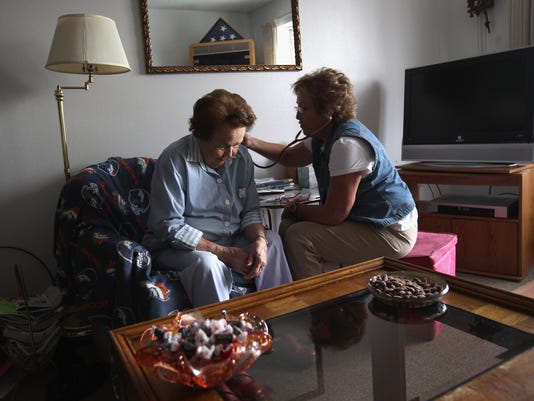
Health care costs continue to be a top retirement concern, yet few Americans know about their options and the potential pitfalls.
Instead, there are many misconceptions about long-term care.
A case in point: Currently about 42% of financial advisers say their clients are considering giving away their assets to their children so they can qualify for Medicaid and avoid paying for a nursing home, according to a survey of financial advisers by Nationwide Financial released Friday.
“Medicaid was created to help low-income Americans and not to supplement middle-class and affluent families,” says John Carter, president of distribution and sales for National Financial. It’s not against the law to give away assets to qualify for Medicaid, and Carter says there are some circumstances when such steps are appropriate.
But many Americans do not understand the consequences of relying on Medicaid such as the fact they will be giving up control of their long-term care planning. That flies in the face of another finding of the Nationwide Financial survey: Many clients tell their advisers that maintaining control is the most important aspect of retirement health care planning.
“I always tell parents that if you give the money to your kids you have to understand that you are irrevocably parting with it and you may never see it again,” says K. Gabriel Heiser, an elder law attorney and author of How to Protect Your Family’s Assets From Devastating Nursing Home Cost: Medicaid Secrets.
And they must comply with Medicaid rules. For example, the nursing home they would like to stay in may not accept Medicaid patients. Although Medicaid programs vary by state, few will pay for home health care. And a third of doctors do not accept Medicaid patients, according to an August study by Health Affairs.
Married couples need to know that Medicaid rules provide some protection to the spouse who is healthy and still at home while their partner is in a nursing home. Among other things, they can keep a certain amount of money and their home. But it’s a modest amount and may not provide them the lifestyle they expect, Carter says.
Options besides giving away assets to qualify for Medicaid include:
• Paying your own way.
Wealthy people who want to retain control of their finances may decide to foot the bill themselves. Experts say that if someone has several million dollars in assets, they can afford to pay for nursing home care given that the average stay is less than three years.
Wealthy people who want to retain control of their finances may decide to foot the bill themselves. Experts say that if someone has several million dollars in assets, they can afford to pay for nursing home care given that the average stay is less than three years.
“If you’ve got the money to pay for it, then that’s where it should go,” says Jim Miller, the Savvy Senior syndicated columnist. “If not, they are using the system to protect their money, pass it on to their kids, and then the taxpayers pick up the cost.”
• Buying long-term care insurance.
These plans often provide other options, such as home health care. The one drawback of this is somebody might put a lot of their savings into something that they may never need.
However, some insurance companies can add a long-term care insurance rider to life insurance policies. Then if the policyholder never needs long-term care they still can provide income to their heirs.
• Set up a trust.
Those who want to protect their assets also can consider setting up an irrevocable trust instead of giving money to their children. And there are some irrevocable Medicaid annuities that provide an income stream.
Long-term care planning is clearly complicated and it’s not easy to find the best option. Although Heiser’s book helps consumers understand the rules, even he says that “it is definitely not a do-it-yourself project.”
Source: USAToday.com

Previous review from client:Inna Fershteyn is excellent attorney. I saw several attorneys before and none of them helped. My company was supposed to repay a huge amount back to Medicaid. We were under Medicaid Fraud Investigation. Inna gave us excellent advise and helped us to stay in business. I would recommend her office and would come back in case I need any legal advise.Law Office of Inna Fershteyn(718)333-2394www.BrooklynTrustAndWill.com1517 Voorhies Avenue, Suite 4 Brooklyn NY 11235